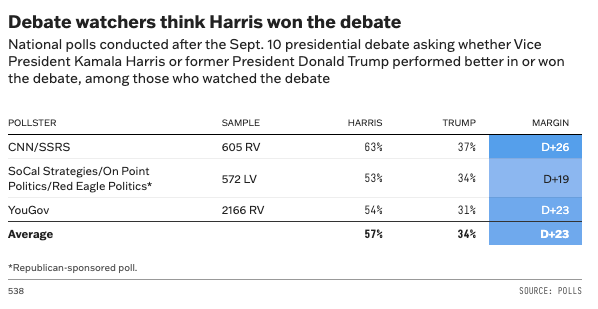Presidential Debate: Kamala Harris Emerges as Early Winner, But Will It Make a Difference?
The first presidential debate between former President Donald Trump and Vice President Kamala Harris took place on Tuesday night, with both candidates hoping to gain an advantage in the closely contested race. Early reviews from the American public suggest that Harris came out on top, according to polls collected by 538.
In the polls conducted since the debate, a majority of debate watchers said that Harris won the debate. On average, 57 percent of national debate watchers thought Harris performed better, while only 34 percent believed Trump did. This positive response for Harris is reflected in a poll conducted by CNN/SSRS, which showed that her net favorability rating among debate watchers improved from -11 percentage points before the debate to +1 point after it. Trump’s net favorability rating, on the other hand, remained largely unchanged.
However, it’s important to consider a few caveats. Firstly, it is still early, and only a few polls have been conducted since the debate. More data will be available soon, which may either confirm or challenge these initial findings. Additionally, perceptions of the debate may evolve as viewers continue to analyze it and share clips with others who didn’t watch it. Therefore, a poll conducted this weekend could yield different results than one conducted immediately after the debate.
Furthermore, even if Harris performed better, it doesn’t guarantee a significant boost in the polls for her. The CNN/SSRS poll revealed that only 4 percent of debate watchers said the event changed their voting preference. 82 percent stated that the debate had no impact on their decision, while 14 percent admitted that it made them reconsider but not change their mind. Two other post-debate polls, conducted or sponsored by Republican firms, asked respondents directly about their voting preferences. SoCal Strategies/On Point Politics/Red Eagle Politics found Harris leading Trump by 3 points nationally, while Trafalgar Group/InsiderAdvantage found the candidates virtually tied in the big seven swing states. However, it’s important to note that these are only two surveys, and more data is needed to determine if the debate influenced voter preferences.
Historically, strong debate performances have not always translated into lasting gains in the polls. For example, Americans believed that Hillary Clinton performed the best in all three debates against Trump in 2016, and she saw a temporary rise in national polls after the first two debates. However, the race tightened in the final days, and Clinton ultimately lost the election. Similarly, in 2012, Americans overwhelmingly considered Mitt Romney the winner of the first debate, and he experienced a boost in the polls. However, they preferred Barack Obama’s performance in the subsequent debates, and he went on to win the election.
It’s worth noting that in 2008 and 2020, the candidates perceived to have won the debates (Obama and current President Joe Biden, respectively) also won the elections. However, these years had multiple debates and were closer to Election Day compared to this year’s debate. With more time between the debates and the election, there is a greater chance for the debate to fade from voters’ minds.
Ultimately, the presidential election was already very close before the debate, and it is likely to remain close afterward. It is crucial to monitor polling averages over the next few days to see if future polls reveal any significant shifts in voter preferences.

